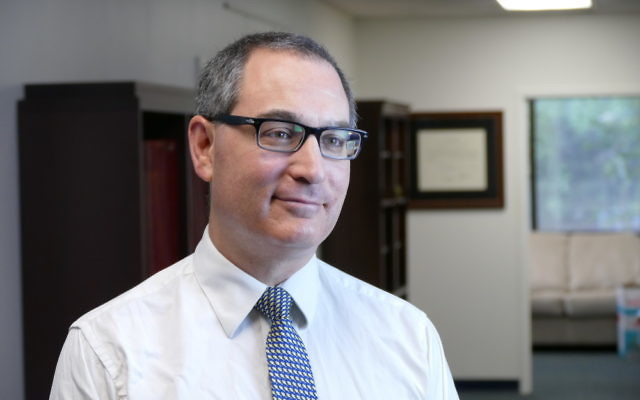Editor’s Notebook: 4 Years Far From Jewish Home
It’s time for a merciful break from anything involving elections because something much more important is happening: We’re delivering the second of our two sons to college this weekend for his freshman year.
If you read through our Back to College section in this issue, you’ll understand that while I’m relieved and excited Caleb has earned a spot at an engineering school that looks like a perfect fit for him, I’m also anxious about the preservation of his Jewish identity.
When I headed off to college 29 years ago, it never occurred to me that support for Israel could be an issue. The start of the First Intifada was still months away. The student body at Tulane University, then as now, was between 25 percent and 33 percent Jewish. And we hadn’t entered an era where being a progressive Jewish college student could mean standing against Israel; a real apartheid state, South Africa, was the focus of campus activism and boycotts.
Back then, Jewish parents worried that their children would chose colleges that weren’t Jewish enough. Without a critical mass of Jewish students, without institutions such as Hillel and Chabad, without the traditionally Jewish houses of Greek life, those eager freshmen could lose all connections to Judaism by graduation day.
But Paula Baroff, who has put her time as an AJT intern behind her to become the director of academic affairs for the Israeli Consulate, made an interesting point about this new world of rising Palestinian activism and falling Israel support on college campuses: Her biggest worries involve the schools with the largest, most active Jewish populations because those are the places targeted by groups such as Students for Justice in Palestine.
In other words, when it comes to Jewish student identity, there may be weakness in numbers.
Paula got to see the rising threat firsthand during her senior year at the University of Georgia, where SJP’s Athens chapter has become much more active, pulling stunts such as disrupting an appearance by two IDF veterans with heckling and a walkout (after eating the free pizza offered by Dawgs for Israel — even student activists are students first and can’t pass up free food).
My older son, Josh, graduated with Paula, but he shied away from activities involving Israel during his college years because he felt pulled between two core beliefs: social justice and Israel. As a result, he didn’t take advantage of the many Jewish opportunities at UGA, which is a shame for him and a concern for the community: How many Jewish millennials will drift away for good after striving to avoid four years of conflict at college?
No. 2 son, on the other hand, faces more of an old-school challenge to his Jewish identity: At the University of Alabama in Huntsville, he’s stepping onto a college campus with no Jewish support structure but a plethora of Christian organizations (and Christians) of various flavors.
The nearest Hillel is 100 miles away in Birmingham. Chabad has a shaliach in Huntsville, but not close to campus. The city has synagogues, and, fortunately, AJT contributor Ted Roberts (the Scribbler on the Roof) and his wife live there. So Caleb will have somewhere to go for a Jewish connection; I only hope he wants one from time to time.
Still, if the rising campus anti-Semitism reported by the Anti-Defamation League and AMCHA Initiative is a long-term trend and not a statistical blip, he might be better off the next four years as a rare but respected Jew rather than one in a targeted crowd.





comments